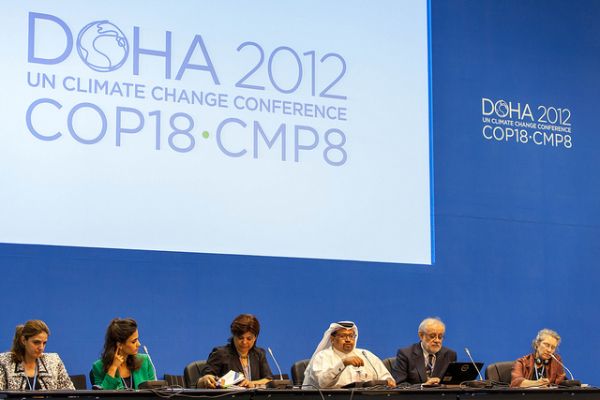Doha Round Hopes for Any Progress on Climate Change

The Doha Climate Change Conference, organized by the United Nations, started last Monday and will last until December 7th. It seems that real progress on climate change is unlikely, particularly regarding an agreement to raise emission cut expectations.
The conference, officially refereed as the 18th Conference of the Parties (COP 18) to the United Nations Framework Convention on Climate Change, is the annual meeting of member states regarding climate change. In comparison to the previous editions, this year's agenda is lighter and no major commitments are expected from the involved parties.
Three mains items are on the agenda:
1. An agreement on a second commitment period for the signatories of the Kyoto Protocol, which is set to end this year.
2. A discussion on long-term cooperative action, both financially and through policy, to achieve reduced carbon dioxide emissions, which would help mitigate the effects of climate change.
3. Reach agreement on the general shape of a consensus that would need to be solidified in a UN-wide treaty by 2015 and take effect in 2020.
The first week, which focused more on informal consultations, led to very little progress. Discussions on the Kyoto Protocol, the only binding treaty on climate change, have narrowed the number points on which the countries will have to agree but broad differences remain on the length of the extension, 5 or 8 years, and the legal nature of the extension.
Negotiations on the long-term cooperative action have remained at a standstill, most apparent by New Zealand's self-ejection from the negotiating table. While 43 island states, which will be the first to be affected from rising sea levels due to climate change, have made clear that time to act is running out. To add to the antagonisms, the rift between developed and developing countries continues to grow.
Carbon emissions regulations are at the center of these disagreements, as emissions in developing countries, especially China and India, grow in accordance with their rapid industrial development. These countries argue that should they comply with protocols, economic development will be compromised. Additionally, financial aid from developed countries to the global south to curb carbon emission has yet to be guaranteed for the 2013-2020 period, making developing countries skeptical of their ability to comply to global emissions standards.
These divergences could jeopardize the negotiation process for the new 2020 global treaty. However, participants and activists are hoping the major achievement of the conference, if anything, will be some semblance of a consensus on steps towards curbing climate change.




